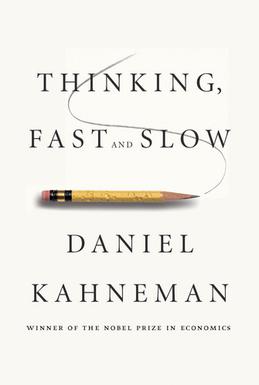Recently I wrote about three interesting books on the psychology of choice. In this post, I want to explore a couple of books that help to explain why humans sometimes make bad choices. Basically, our brain works in ways that can trick us into irrationality.
Nobel prize-winning economist Daniel Kahneman illustrates this with the following example: imagine a bat and ball together cost $1.10. The bat costs $1 more than the ball. How much does the ball cost?
Without thinking, most people will jump in and say 10 cents. Your brain is probably itching to shout it out! But think about it: if the ball cost 10 cents, then the bat would have to cost $1.10 (we know the bat costs $1 more), meaning the two together would be $1.20. If we sit down and do the sums we can see the only answer that satisfies the supplied facts is that the ball costs 5 cents, the bat costs $1.05, and together they are $1.10. It’s basic arithmetic. So why are so many people fooled?

In Thinking Fast and Slow, Kahneman describes two distinct ways our brain thinks:
- System 1: Fast, automatic, frequent, emotional, stereotypic, subconscious
- System 2: Slow, effortful, infrequent, logical, calculating, conscious
System 1 is the quick, instinctual and heuristic-led thinking that takes place without any real effort or control on our part. While it’s useful (we sometimes need to act rapidly without methodically thinking through every possible option), it’s also easily fooled in a way that our more methodical System 2 is not. But because System 1 acts subconsciouly, it can be hard not to listen to it. Even when System 2 thinking leads us to the correct answer (such as in the bat and ball example above), System 1 is still nagging us in the background, meaning the rational answer often just doesn’t “feel” right.
There are a number of heuristics the System 1 brain uses. One example is the availability heuristic – we tend to think things are more likely if we can recall specific examples of them happening. This is why people tend to think plane travel is riskier than it actually is, and might also be an explanation for why people tend to consistently overestimate the number of immigrants or the proportion of the population claiming unemployment benefits (two topics that are mainstays of the tabloid media).

In Predictably Irrational, Dan Ariely describes how our economic decisions are affected by the way we think. Some of my favourite examples show how money can skew behaviour in unexpected ways.
In our market society, money is seemed as the ultimate incentive. However, as Ariely shows, it’s not as good a motivator as economic theory would have us believe, and can actually lead to perverse incentives. He describes research in which people who were paid to do a simple task did it less efficiently than people who were doing it without payment, as a favour. Adding money into the equation turns a social contract into an economic one, and it changes the nature of the transaction.
In one striking example, Ariely describes a study of a child care centre in Israel that started to charge fines of parents who collected their children late. Market logic would dictate that the fine would be a financial disincentive, and fewer children would be picked up late as a result. In fact, the opposite happened: rather than parents apologetically arriving late (because they had transgressed a social norm), late pickups became more common. The fine was essentially seen as a fee-for-service, one which parents could pay for unapologetically. A social transaction had become an economic one. Interestingly, the tardy behaviour continued even when the fine was subsequently removed. A transaction based on goodwill had permanently shifted to one based on financial exchange.
Other studies show how things offered for free are perceived as qualitatively different from ones that attract a charge, even when that charge is quite modest. Even when the free offer is not the best offer available, most people will still opt for the free deal.
